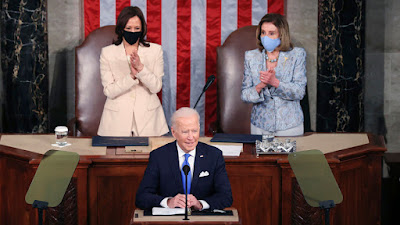 |
President Joe Biden addresses a joint session of Congress, as Vice
President Kamala Harris (L) and House Speaker Nancy Pelosi look on,
April 28, 2021 | Chip Somodevilla/Pool via AP |
The University of Denver panel of political scientists and experts asked to grade President Joe Biden’s first 100 days settled for an A-, with a few caveats.
The group, made up of professors Tom Cronin, Andrea Benjamin, Seth Masket and Floyd Ciruli, saw Biden overcoming a disastrous transition and benefitting from low expectations. His success with managing the vaccination program and passing the massive relief legislation were high points that earned him the first positive public approval after President Trump’s four years. Having avoided gaffs and given several successful presentations, including press interactions and a speech before Congress that helped drive his agenda.
In the discussion, which was moderated by Chancellor Jeremy Haefner, I pointed out that, while focused on the pandemic and economic relief, he also signed a record number of executive orders (42) to reverse what Democrats considered Trump’s most egregious actions and help handle the myriad of constituencies and issues needed to maintain Democratic Party unity. Also, he used appointments to address constituent and party agendas. In addition, the massive relief expenditure ($1.9 trillion), which was more than twice President Obama’s economic stimulus of 2009, helped assuage liberals that their concerns about economic support and inequity were getting attention.
The group suggested Biden’s lowering the rhetorical volume and heat contributed to his success. Style and tone matter – Trump was the un-Obama, very loud, hostile, anti-establishment (including for Republicans McCain. Flake, Bush and Romney) and especially in opposition to the media. Whereas Biden is the un-Trump – very low-key, focused on a moderate tone, a sharp contrast in behavior and language. He’s deliberately not dominating the news cycle everyday with personal commentary and opinion.
The generally upbeat assessment had several caveats. Immigration management appeared repeatedly in for criticism. The understandable tension between humanitarian improvements and the surge of new arrivals was not anticipated, accompanied by mixed messages and not well- managed as it developed. The administration argued the lack of information and cooperation during the transition contributed to the chaos, but the political damage with both supporters and immigration opponents was done. From the left, there was criticism that there are many expectations that have not been met and political realists pointed out that there is a significant chance Biden could lose his majority in both houses of Congress next year.
So, a good 100 days, but many challenges in the next 600.











